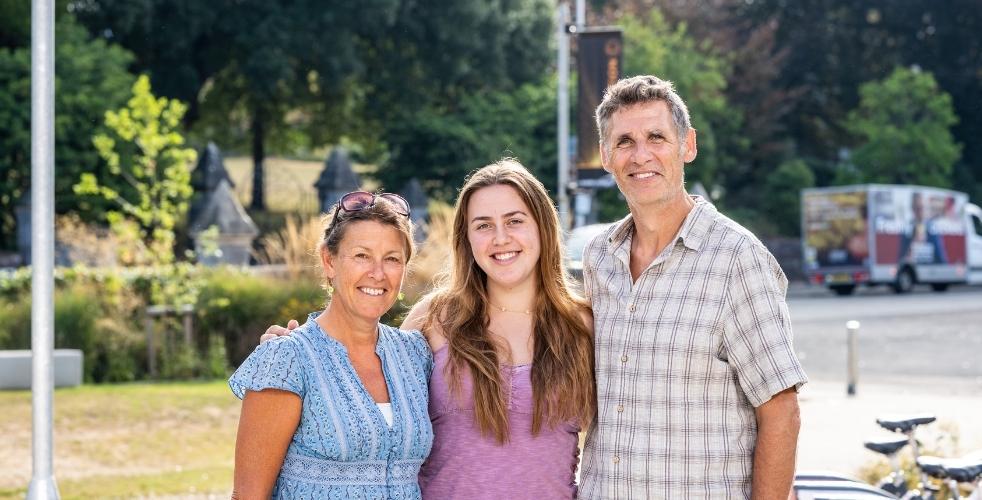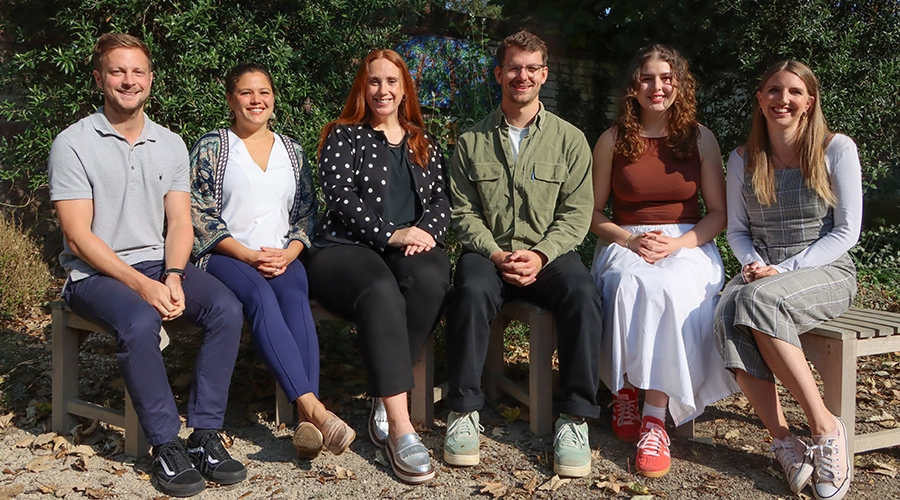Parent/Guardian Guide for Applicants
We understand that you may have questions about Exeter College, so we have created this guide specifically for the parents and guardians of students, often in year 11, who are in the process of choosing their post-16 options.
(As we have students from a variety of personal circumstances e.g. living with parents, guardians, carers or older siblings, etc. we often refer to them as your ‘young person’.)

COURSES AND LEVELS
Students aged between 16-18 can study at a variety of levels at Exeter College, and the level they start at will usually depend on the grades they have achieved in their GCSEs. If a student has not achieved a grade 4 in maths and/or English they will be required to continue studying these subjects alongside their course. Our school leavers courses page includes a table to explain how the GCSE grades achieved at school equate to course levels at Exeter College. Occasionally if a course is very skills based, for example catering or construction, a student may be required to start at a lower level before progressing to the next level.
We also understand that some young people may not have taken a full programme of GCSEs or may have been educated at home or overseas. We will consider each student on an individual basis, and their qualifications and experience will be discussed fully during their interview. Please contact us if you have any specific questions about entry requirements prior to application.
HOW CAN MY YOUNG PERSON FIND OUT MORE ABOUT EXETER COLLEGE?
Students can find out more about Exeter College by reading our School Leavers Course Guide. Guides are delivered to schools in September so your young person may have already received one. If not, a copy can be viewed online or posted out by request.
OPEN EVENTS
We have several open events every academic year, usually three times per year in October, November and April. Find out about the upcoming dates and register for updates on our Open Events page.
APPLYING TO EXETER COLLEGE
Most students use the online application to apply to Exeter College, and this video has some hints and tips on how to complete the form. Students can use a paper application form if they prefer and this can be downloaded from our website, or posted out on request. However, it is more difficult to make any subsequent changes to a paper form, as the admissions team would need to be contacted directly, so most students prefer to apply online.
Although there is no deadline for applications (prior to the start of enrolment) we recommend they apply early in the academic year, once they have decided on their course choice, as this should guarantee an earlier interview.
Sometimes schools set a school deadline for students to complete their applications, so they can ensure all students have a plan of study in place for after their GCSEs. The application process is explained further here.
INTERVIEW
Once we have received the college application, this will be processed by the Admissions Team. Students will be contacted shortly afterwards with the details of their interview, which will be held in person. Interviews are held after school time, on a regular basis from November to June. The interview typically lasts around 15 minutes. The interview process is very supportive and allows us to ensure the student is choosing a course that matches their likely GCSE grades, and is suitable for their chosen progression route. It is also an opportunity for us to find out more about them, and their hobbies and interests, and also gives the young person a chance to ask questions themselves. All students will have an interview to ensure they are offered a place on the right course for them. The conditional offer is given at the end of the interview if the teacher and learner are happy.
Sometimes a student’s application may be placed on hold whilst the college requests supporting information. This may be due to support requirements that a student has indicated on their application form, the fact that they have indicated they require a visa to study in the UK or are currently living out of the local area, or other information that they have disclosed on their form. If this is the case with your young person, you will be kept informed of the process and the reasons why the application is on hold, and what additional information is required. We may request this information from you or another agency, and once this has been received and assessed by our admissions and/or support team, we will be in touch with further information about the interview.
ENROLMENT
Once students have received an offer, we ask them to focus on their GCSEs and the last few months at school. Once students have received an offer we ask them to focus on their GCSEs and the last few months of school. We will contact your young person at the end of July to invite them to their enrolment appointment which takes place after GCSE results day at the end of August/start of September. Students must attend the appointment in person, so we request that students are available during that time.
At their enrolment appointment, students will meet with a subject lecturer from their chosen course/s, discuss their results and confirm which courses they wish to enrol on. They can also find out more about travel and financial support during enrolment.
TRAVEL
Over 60% of our students travel from outside of Exeter, and most of these will use public transport. Please see travel pages for more information about our travel scheme, which can support our learners who live more than 3 miles from the city.
FINANCIAL SUPPORT
The 16-19 Bursary Fund is available to help students to complete their studies if they are in financial hardship and struggling with the costs of coming to college. Please visit our bursary pages to see if your young person would be eligible for financial support during their time at college and to register your interest.
STUDYING AT EXETER COLLEGE
To support students to succeed in both their studies with us, and preparation for life after college, we have created a Personal Development Programme (or PDP for short). The Personal Development Programme provides the foundation for studies at Exeter College, ensuring they have a Personal Tutor to provide regular 1:1 support and guidance to help them to achieve their goals. In addition to this, students will work together with other learners to explore a range of Essential Core Themes such as health and well-being, citizenship and personal safety, all of which provide an important basis for them to thrive both here at the college and beyond.
Class sizes often range from around 16-24, however, groups within some faculties, for example Foundation Studies, may be considerably smaller. The college day runs from 9am – 4.30pm, but timetables are specific to each course, and students will be given their timetable during their first week at college in September. Example timetables are available in the course guide.
Depending on the course, students may have study periods built into their timetables, or possibly a whole study day which allows students to complete assignments, or undertake work experience. Our Learning Resource Centres (LRCs) are bright, spacious and well equipped spaces for students to work in, and are available across the city centre and satellite sites.
At Exeter College we know that keeping parents and guardians updated on progress is key to ensuring that our learners thrive and succeed with us. Once a young person has enrolled, parents and carers can register for our Parent Portal which is an online space where parents and guardians can track the progress of their young person at college. You will be able to see what course(s) your young person is enrolled on, along with attendance data, timetables, progress reports and tutor contact information.
WHAT CAN MY YOUNG PERSON DO AFTER STUDYING AT EXETER COLLEGE?
Students at Exeter College progress on to a variety of different routes after studying at Exeter College. Some students will stay at the college to study at a higher level, others will go directly into employment or look for an apprenticeship.
Many of our students choose to progress to university and our students will access universities throughout the UK and even occasionally overseas, studying a variety of courses from maths, science, engineering and medicine, to humanities, English, modern foreign languages and the creative arts.
We work with our students during their time at college, to ensure wherever they wish to head afterwards, they are fully prepared, encouraged and supported. Our Future Steps team, as well as the Apprenticeship team, are on hand to support our learners with their next steps. Please click here for more information about our careers programme.
MY YOUNG PERSON IS INTERESTED IN STUDYING AN APPRENTICESHIP
Many young people are interested in becoming an Apprentice after they have finished their GCSEs, but students do need to find a job to be able to start their apprenticeship. We suggest they spend time thinking about what sector they would like to work in, and the kind of companies they would like to work for. It is also important that they prepare a CV and covering letter, and the Apprenticeship team at Exeter College will be able to help with this, as well as job searching and interview preparation. Please click here for more information about Apprenticeships, including current vacancies. If a young person wishes to become an Apprentice but doesn’t have an employer when they complete their college application form, we ask them to apply for a college based course as a back-up option to ensure they have plans in place for September.
Find out more
Our College Advice Team are trained in information, advice and guidance and support students to choose their college courses. They work in many schools across the South West giving face to face advice and guidance about opportunities for school leavers at Exeter College, and also offer various virtual and, when possible, face to face events at the college. Click here for more information, including guidance on making subject choices, links to handy websites for further research, and upcoming events.
The College Advice Team also keep in touch with parents through some school’s parent mail systems, and have also created a parents presentation and student journey video.

